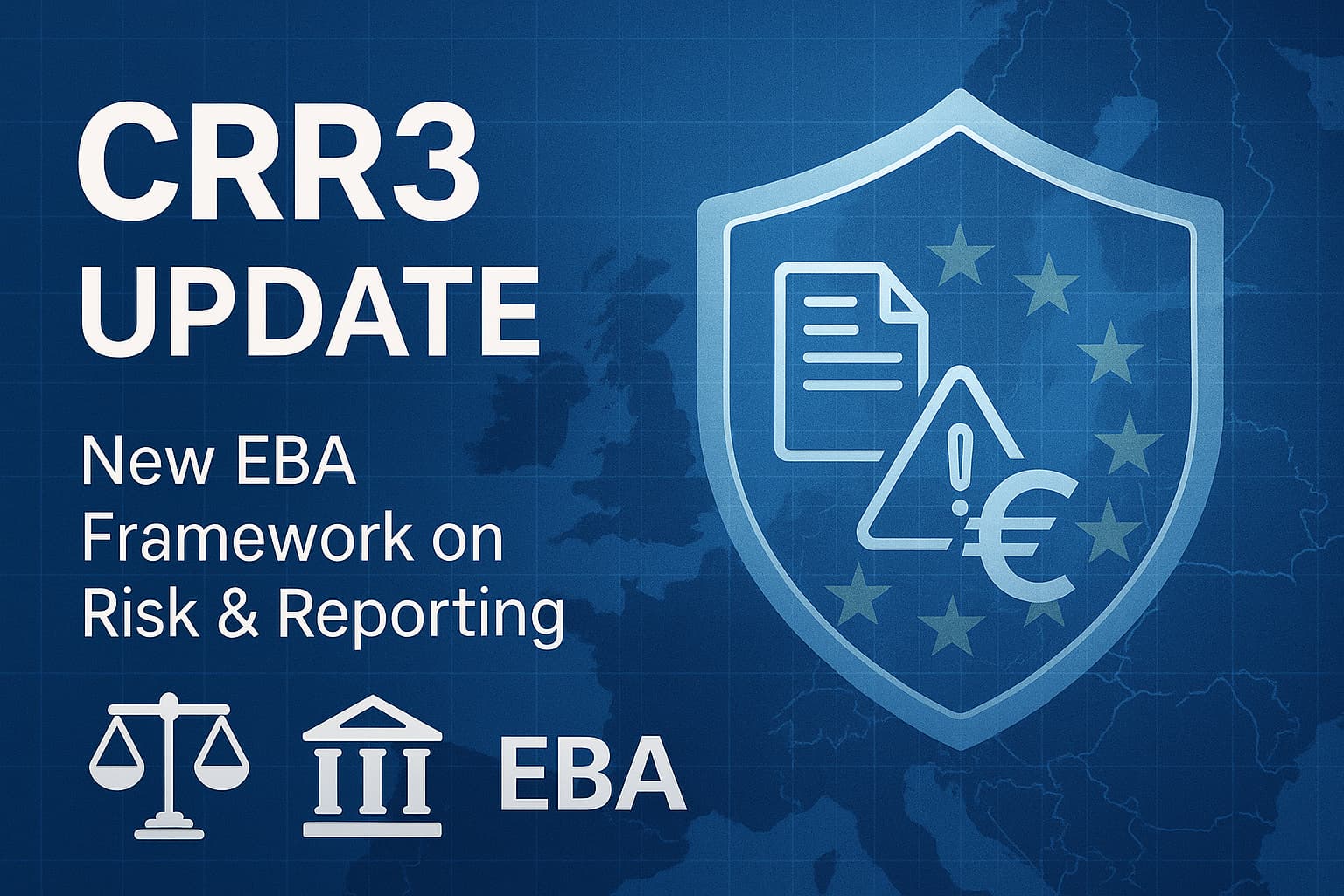
The European Banking Authority (EBA) has made significant strides in rolling out the next phase of CRR3 (Capital Requirements Regulation III), setting the stage for a more robust and transparent risk framework across the EU banking sector.
Between December 2024 and June 2025, the EBA delivered key Regulatory Technical Standards (RTS) and Implementing Technical Standards (ITS) that address market risk, internal models, benchmarking practices, and resolution planning. These developments not only bring clarity to CRR3 expectations but also mark a shift from regulatory drafting to implementation planning for banks and supervisors.
Key Developments:
1. Market Risk RTS – Long/Short Position Classification
Published: 6 December 2024
The final RTS outlines how institutions must identify key risk drivers and classify exposures as long or short. It introduces simplified methods for plain-vanilla instruments, paving the way for adoption of the FRTB-SA (Fundamental Review of the Trading Book – Standardized Approach) and SA-CCR (Standardised Approach for Counterparty Credit Risk).
Next Step: Awaiting full activation alongside the CRR3 market risk framework.
2. Residual Risk Add-On (RRAO) Exemptions
Published: 17 December 2024
This RTS provides specific conditions under which hedge instruments may be excluded from the capital-intensive RRAO. The aim is to ensure genuine hedging strategies are not unfairly penalized under FRTB.
Status: Will become effective with formal implementation of CRR3 per Delegated Regulation (EU) 2024/2795.
3. IRB Model Change RTS – Consultation Phase
Opened: 9 December 2024
These draft standards addresses what constitutes “material changes or extensions” to IRB models. It aims to improve governance and transparency in supervisory approvals for model updates.
Timeline:
- Public hearing held: 15 January 2025
- Consultation closed: 10 March 2025
- Final review in progress; adoption expected by late 2025
4. ITS for Benchmarking Internal Models
Effective Date: 1 April 2025
This ITS amends existing benchmarking requirements and applies to 2025 model performance reviews. It covers benchmarking across credit risk, cross-asset market risk, and IFRS 9 models, helping supervisors assess model consistency across banks.
5. ITS for Resolution Planning
Adopted: 7 May 2025
This regulation simplifies data templates and improves the reporting process for resolution planning, making it easier for both banks and resolution authorities to prepare stress scenarios and recovery strategies.
Next Steps:
IT tools, taxonomies, and data infrastructure will roll out in Q4 2025. First submissions are expected in early 2026.
Where Things Stand
| Regulatory Area | Current Status | Next Milestone |
| Market Risk RTS (Long/Short) | Final draft published | Implementation aligned with FRTB rollout |
| Residual Risk RTS (RRAO) | Final draft published | Effective upon CRR3 enforcement |
| IRB Material Model Changes | Consultation phase completed | Final review; adoption expected late 2025 |
| Benchmarking ITS | In effect since April 2025 | Data collection underway |
| Resolution Planning ITS | Adopted May 2025 | Tech rollout Q4 2025; reporting begins 2026 |
Implications for Banks & Supervisors
The EBA is clearly prioritizing a phased, practical approach to CRR3 rollout—balancing regulatory precision with industry readiness. Here’s what it means for stakeholders:
- Clearer Rules, Greater Consistency
Revised standards clarify key definitions, such as how to determine risk exposures, qualify hedges, and assess material IRB changes, making supervisory expectations more consistent across jurisdictions.
- Time to Prepare Systems and Models
Banks must now align internal models with FRTB-SA and SA-CCR, adapt IRB governance frameworks, and prepare for increased benchmarking and resolution data reporting requirements.
- Collaborative Regulatory Tone
Through public consultations, hearings, and staged timelines, the EBA signals its commitment to industry feedback, encouraging proactive preparation over last-minute compliance scrambles.
Looking Ahead: From Rulebook to Execution
Since December 2024, the EBA has shifted decisively from drafting policy to preparing for deployment. With final RTS and ITS documents largely in place, the focus now turns to execution, from IT infrastructure and internal controls to model validations and reporting automation.
Institutions that invest early in systems alignment, risk governance, and supervisory engagement will be best positioned to meet the demands of Q4 2025 and early 2026, when new compliance, benchmarking, and resolution cycles go live.
For EU banks and regulators alike, the message is clear: the roadmap to CRR3 compliance is here and now is the time to act.




